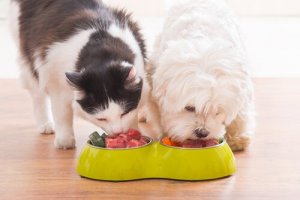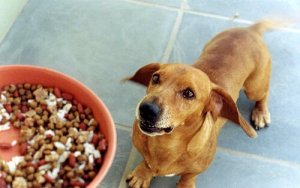Pet Care: Poor Nutrition and Associated Health Issues


Written and verified by the lawyer Francisco María García
Poor nutrition can be extremely harmful to your pet’s health. Remember that the saying “you are what you eat” also applies to our pets. Every species requires a specific diet to keep it happy and healthy throughout its life, and as pet owners, it’s our responsibility to provide the right food.
A balanced diet
Primitive humans used to hunt for their food, and share the meat with wolves. Much later, we began feeding our pets human food, but soon found that it caused a number of digestive issues.
This led to the development of specially formulated pet foods, which are required to offer a nutritionally complete and balanced diet for each species at each stage of its life.

The best way to avoid health issues associated with poor nutrition is to make sure your pet eats a balanced diet that meets all its nutritional requirements. It’s important to take into account aspects such as age, weight, size and any health conditions it might have, such as allergies.
If you adopt a puppy or kitten, we would recommend consulting with your vet to establish the right diet for your pet from the very start. We would also advise that you talk to your vet before making any changes to your pet’s diet, whether it be a puppy, adult, or older dog.
Human food and poor nutrition in pets
If an animal is obviously underweight and malnourished, it’s essential to provide them with a diet that will help strengthen their immune system. Once again, it’s best to seek veterinary advice.
It’s also important to avoid giving your pet human food, especially food that is heavily processed and contains large amounts of artificial ingredients. Many of the ingredients and condiments we use in our food are harmful to animals, causing allergies and sometimes even poisoning our pets.
Poor nutrition and associated health issues
The level of malnutrition determines the severity of the resulting health issues. As their immune system becomes weaker, their health will deteriorate more quickly. In severe cases, the damage may be irreversible.
Here are 4 of the most common health issues associated with poor nutrition in pets:
1. Allergies
Some proteins and fatty acids can cause allergic reactions in more sensitive animals. Fortunately, there are a number of good quality hypoallergenic pet foods on the market.
Animals suffering from food allergies often experience skin complaints such as redness or rashes. In more serious cases, they may also develop respiratory issues.
There are a number of simple tests which can help determine the cause of your pet’s allergies. Talk to your vet for full information and advice.
2. Diarrhea
Diarrhea is one of the most common signs of digestive distress. It could be a symptom of poisoning, allergies, intestinal parasites or food poisoning.
Diet-related diarrhea can be due to an excess of protein or fat. In some cases, it may be a sign that the pet food is poor quality, or may have been improperly stored. Sudden changes in diet have also been known to cause diarrhea in animals.
Choosing the right food for your pet is essential. If you decide to change pet foods, it’s important to let your pet adapt to the new food gradually.
3. Gastritis
Gastritis is often caused by a reaction to bacteria, internal parasites or a food intolerance.
Needless to say, the quality of the pet food is essential. However, it’s also important to store the food properly, choosing a cool, dry place with no direct exposure to sunlight. Failure to store food properly can lead to the growth of fungus and bacteria that could poison your pet.
4. Esophagitis
While this is probably the rarest of these 4 health conditions, it can be very serious, and will require urgent veterinary attention. The most common cause of esophagitis is the ingestion of cooked bones.
While dogs do have some ability to digest bones, they can only eat them when uncooked. Cooked bones are more likely to splinter, often getting stuck in the esophagus or puncturing the intestinal tract.
How to avoid malnutrition in pets
First things first, you have to choose the right food. Remember, a large price tag isn’t always a sign of good quality. The best pet foods should contain all the necessary nutrients for healthy growth and development.

Before you buy food for your pet, we would recommend taking a close look at the nutrition label on the back of the pack. Though the ratios will vary according to the age and size of the animal, a good quality pet food should contain proteins, fats, carbohydrates, fiber, vitamins and minerals. You’ll also find a wide range of pet food specifically designed for puppies and kittens.
If you’re looking to find a low-cost pet food without compromising on quality, we would recommend doing a quick comparison of the different options on the market. Using a recognized, high-quality pet food as a guide, you should be able to find a cheaper product with a similar nutritional content. However, when it comes to buying food, it’s the health of your pet which should take priority.
This text is provided for informational purposes only and does not replace consultation with a professional. If in doubt, consult your specialist.